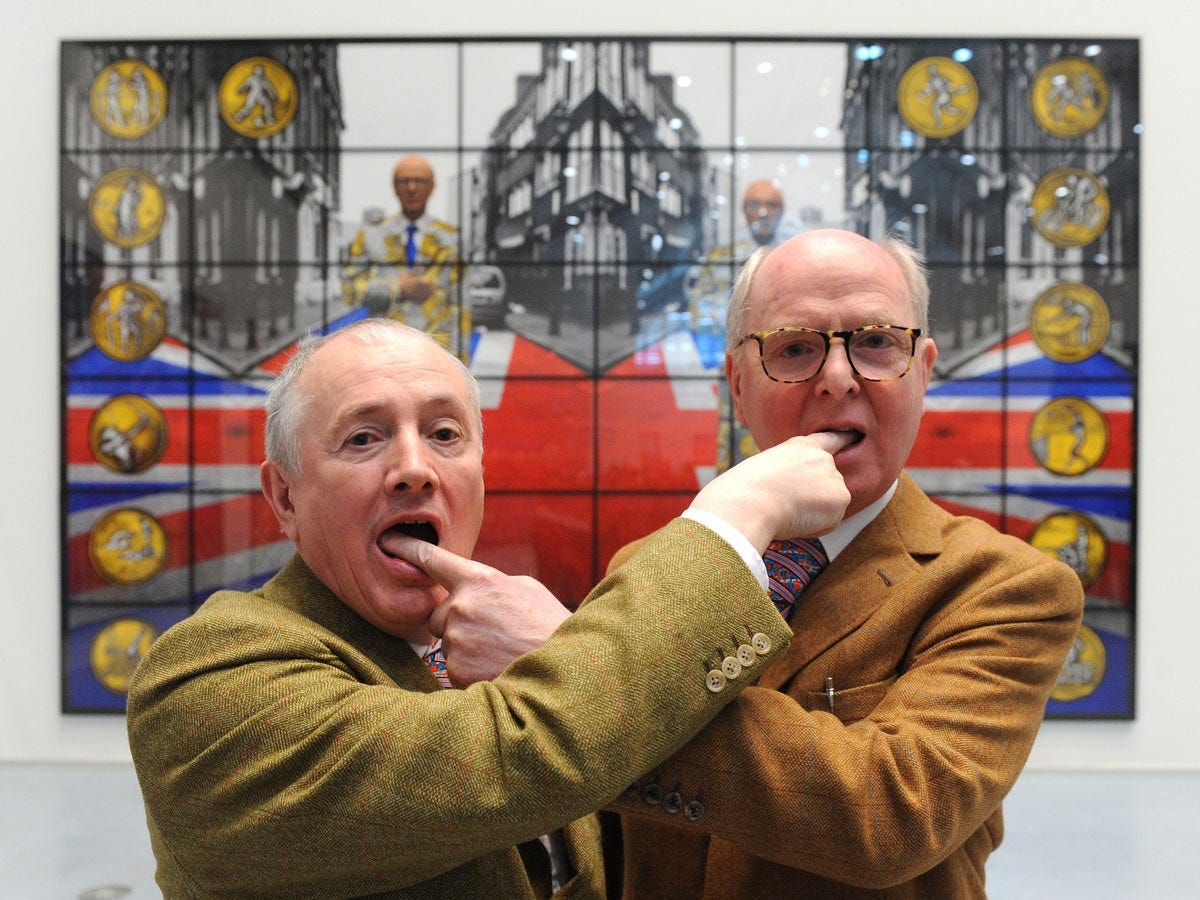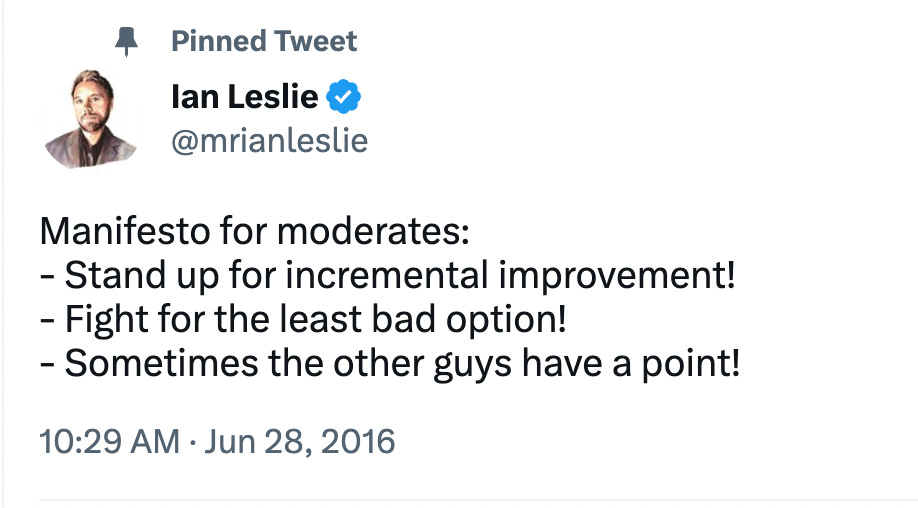The Case For Centrism
It's about the median, not the middle
“We want our art to bring out the liberal from inside the bigot, and the bigot from inside the liberal.” Gilbert and George
The centrists are back in charge, for now. Trump and Johnson and Corbyn are out; Biden, Sunak and Starmer are in. Even the fascists have gone centrist. Still, centrism will never be sexy. Nobody’s heart pumps faster at the thought of moderation breaking out. Centrists are not the best advocates for centrism, partly because many of them don’t want to be labeled as such. But I think there is a case for be made for centrists - as a class of politicians and thinkers who are wary of labels in general.
Political identification is antithetical to thinking. The keener you are to be a libertarian, socialist, feminist, a Tory or a Labour supporter, a Republican or Democrat, the less mental freedom you allow yourself. Once you give yourself a label, you make it less likely you’ll form thoughts that don’t fit the label, even when those thoughts are truthful and interesting. Confronted with any given question you instinctively seek the position consistent with your self-definition.
This doesn’t happen consciously. It’s automatic. Once you’re invested in an identity, certain positions, certain opinions, get neurologically marked as dangerous or out of bounds. It’s like programming your brain with an algorithmic bias. Once you see yourself as part of a group, those internal prohibitions get reinforced by your allies and enemies. You become focused on who you’re for or against, rather than on what. Twitter compounds this tendency. On the controversy of the day, users simply figure out which groups are associated with which positions and read off their opinion from the grid. In place of real thinking and understanding we pattern-match, like an LLM. Thinking for yourself rather than for an identity won’t necessarily make you more right, but it will tend to make you a better thinker and a less predictable one.
This isn’t to say you shouldn’t assume any political identity. Most of us are governed by a few core intuitions which we dress up as beliefs, and absolute freedom of thought isn’t even desirable - that way madness lies. The infant brain is a blooming, buzzing confusion of thoughts and sensations which must be pruned and sculpted into a self. Surrendering intellectual sovereignty comes with benefits. Having a badge makes it easier for you to associate with like-minded allies, and to organise into movements that effect change and drive progress. Any healthy society needs a mix of free agents and group actors.
My point is that for each of us there is a fundamental trade-off to confront: between freedom and identity, thinking and organising. Politics is necessary but politics makes us stupid(er). We can’t do anything about that; we can only recognise it.
Personally, I’m not keen on defining my politics. I’d rather maximise my cognitive freedom and work through each question as it presents itself instead of worrying about which side of a line I’m going to land on. That’s why I’m a writer and not a politician (well, it’s one reason). I’m glad that people organise themselves into political parties and movements, I truly am, but I’m not a joiner by nature. I can’t even commit to a football team. I have no strong opinion on Marmite.
I’m not denying that I have a consistent mental framework through which I filter political questions, or even a preferred political party. I don’t for a moment imagine that I’m some crazy indefinable political anomaly - my views are pretty normcore. I’m happy to let others identify me (I mean, if they’ve really nothing better to do). It’s self-identification I avoid. A badge shaves a few points off your IQ, and some of us don’t have points to spare.
Having said all that, fellow Substacker Jonn Elledge recently reminded me that I do have this as my pinned tweet:
So, what does it mean to be a moderate? Not much really - even when writing that jokey tweet, I cunningly chose a term that’s as vague and capacious as possible. Most people regard themselves as moderate, even Jonn (albeit a left-leaning moderate, in his case). Maybe we can get further with “centrist”. In a post that’s critical of centrism Jonn points out that centrists are “untethered” by consistent values, as if that’s an obviously bad thing. I hate the thought of wearing a mental dog collar. I am undoubtedly “tethered” by my core intuitions but I prefer to keep the leash as loose as possible. As Emerson says, consistency, in the sense of fidelity to past positions, is a dull aspiration. Messiness, doubt, and inconstancy are signs of lively minds and healthy polities.
But there must be more to centrism than the refusal of ideological rigidity. Perhaps the clue is in the name? The most common definition of a centrist is someone who always heads for the centre point on an imaginary political spectrum. Call it Compromise Centrism. The Compromise Centrist sees one group arguing that six plus six makes twelve, and another group insisting it makes ten, and says, “Look, there’s clearly truth on both sides. The answer must be eleven.”
In real world negotiation you sometimes have to settle on eleven, but if you simply assume or accept that’s the correct answer, you’ve given up on thinking. In CONFLICTED I wrote about Mary Parker Follett, an early twentieth-century American philanthropist, philosopher and pioneer of management studies. Follett advised factory bosses to seek agreements with disgruntled workers (rather than shoot them which is what they instinctively wanted to do), but she didn’t believe in meeting half-way. She believed that when two opposing ideas clash the optimal solution is to create a third. ‘When two people arrive at a common decision, that decision is only really satisfactory if it represents an integration.’
Compromise Centrism is closely related to what I’d call Nice Guy Centrism. You know the type. The demeanour is that of a dad pulling apart squabbling children. They’re always going on about seeing truth on both sides and the importance of rising above personal abuse. Their favourite word is “nuance”. They decry polarisation (guilty as charged, and perhaps I veer into this identity myself - I’ll let you be the judge of that). They’re horrified by “culture wars”.
There is some subtle self-congratulation going on. The Nice Guy Centrist deplores pettiness but “rising above” can be a dominance display. I notice this most often in the trans debate, which to me seems plainly asymmetrical both in terms of clarity of thinking and civility of discourse. The Nice Guys are forever bemoaning the toxicity of the trans debate without correctly identifying the cause of it or bothering to think through the underlying issues for themselves (the former requires the latter). Nice Guy centrism is almost content-free: it’s really a form of image management.
In fact a perennial problem for centrists is that they carry so little philosophical baggage they can float into the ether. They tend to lean on words like “pragmatism” or “evidence-based policy-making” which sound sturdy and sensible but on closer inspection dissolve into a predilection for arbitrary fads. They also rely heavily on intuitions about individual leaders. In a column in praise of centrists Janan Ganesh argues that their core skill is to “read human beings and bet on the least wild-seeming ones”. Now, I do think ideologues tend to pick candidates who are painfully ill-fitted for governance and wonks neglect the importance of leadership qualities. But surely there’s more to centrism than “I’m with her”?
I think there are better, more substantial reasons to be centrist. Here are three big ones.
After the jump - the real case for centrism. Plus a note on the Bud Light/Mulvaney firestorm and what marketers should learn from it. And a Beatles bonus.





